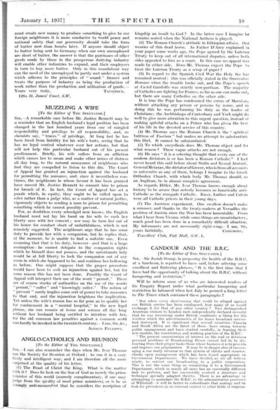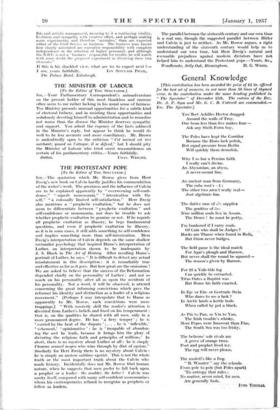CANDOUR AND THE B.B.C.
[To the Editor of THE SPECTATOR.] SIR,—Sir Josiah Stamp, in proposing the health of the 11.11.C. at a luncheon, is reported to have said, before uttering some emollient and flattering phrases, " It is the first time that I have had the opportunity of talking about the B.B.C. without hampering and restriction."
Will he inform sonic of us who are interested readers of his Enquiry Report under what particular hampering and restriction he laboured when last July he penned a long letter to The Times which contained these paragraphs ?
" But when every shortcoming that could be alleged against our British service has been catalogued, how many of us would exchange it for that of any other country t Two distinguished American visitors to Loudon each independently declared recently that he was recovering under British conditions a liking for the wireless which the advertisements of his home broadcast service had destroyed. It is significant that several countries—Canada and South Africa are the latest of them—have swung towardp public management and have studied carefully, in framing their new models, the constitution and working practice of the B.B.C.
" The present concentration of interest on the real or fictitious personal problems of Broadcasting House cannot fail to be dis- tracting from their proper tasks those whose business it is to provide and improve our programmes. It may be in danger also of encour- aging a too ready recourse to that system of cheeks and counter. checks upon management which has been found appropriate to Government Departments. We have decided, as wo all believe wisely, to entrust our broadcasting to a public corporation. This is not the same thing as committing it to a Government Department, which in nearly all cases has an essentially different task to perform, and has successfully evolved a structure and technique specially adapted thereto. There is no advantage in attempting to assimilate the B.B.C. to the administrative processes of Whitehall—it will.he better to subordinate that analogy and to look for precedents in its internal control to other fields of respells.
able and artistic management, ensuring to it a continuing vitality, liveliness and sympathy with creative effort, and perhaps Making more experiments, and therefore mistakes,' than are expected either of the Civil Service or business. The business man knows how closely associated are executive responsibility with complete independence in the selection of higher personnel, and although the B.B.C. is not a business ' responsible for results, he will watch with some doubt the proposed experiment in divorcing these two elements."
If this is his shackled view, what are we to expect next ?-
I am, yours faithfully, IAN SINCLAIR PHAIL.
The Palace Hotel, Edinburgh.







































 Previous page
Previous page